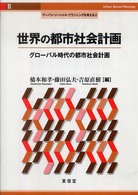- ホーム
- > 洋書
- > 英文書
- > Business / Economics
Full Description
Latin America is a well recognized and growing market, but its poor infrastructure, explosive urbanization, expensive and inefficient logistics, and multiple social problems continue to pose major problems to logistics professionals and academics. The uniqueness and complexity of these issues have long daunted scholars, and there remains an important gap in the literature around Latin American supply chain management and logistics (SCM&L).
Supply Chain Management and Logistics in Latin America brings together leading scholars across Brazil, Colombia, Cuba, Ecuador, Peru, Panama, and the USA in order to address this gap. The chapters collected here, all of which are drawn from selected papers presented at the 2016 MIT SCALE Latin American Conference on Logistics and Supply Chain Management, offer perspectives from five different countries—Brazil, Colombia, Ecuador, Panama, and Peru—and provide insights into cases and new methods written by people who have faced the challenges they discuss. The authors cover a broad range of subjects: in addition to general contributions to qualitative and quantitative methods in supply chain management and coverage of cases of global importance such as the Panama Canal expansion, they offer insights into regionally specific problems around freight corridors in Colombia, reverse logistics and recycling in Colombia, supply risk management in Colombia, and socially oriented logistics in low-income communities in Peru. Since Latin America is one of the most urbanized regions in the world, with about eighty percent of the population living in cities, questions around urban logistics also receive heavy coverage, with four chapters discussing issues unique to very high-density cities and megacities such as São Paulo, Rio de Janeiro, Bogotá, and Quito.
For its explorations of important themes, methods, and local topics within a crucial and ever-expanding market, Supply Chain Management and Logistics in Latin America is a valuable resource for educators, researchers, and practitioners.
Contents
Chapter 1. Introduction; Josué C. Velázquez Martínez, Hugo Yoshizaki and Christopher Mejía ArguetaPart I - General methods in Supply Chain Management
Chapter 2. A proposed set of criteria for supply chain strategy evaluation; Roberto Perez-Franco
Chapter 3. Hybrid heuristic method to solve a two-stage capacitated facility location problem; Geraldo Regis Mauri, Gladyston Mattos Ribeiro, Rômulo Louzada Ribeiro
Part II - Applied research in Latin America
Chapter 4. A multicriteria location model for a solid waste disposal center in Valle del Cauca, Colombia; Carlos Alberto Rojas Trejos, Julián González Velasco
Chapter 5. Value-added logistics services potential after Panama Canal expansion; Juan M. Castillo, Zoila Y. Guerra de Castillo, Ada Carolina Kelso, Pablo Alcides Arosemena
Chapter 6. Evaluation of best practices introduction for the managerial improvement in the urban freight transport; Cíntia Machado de Oliveira, Márcio de Almeida D'Agosto, Daniel Neves Shmitz Gonçalves, Renata Albergaria de Mello Bandeira, George Vasconcelos Goes, Lino Guimarães Marujo
Chapter 7. Analysis of urban logistics measures in an HORECA intensive area. Case study: "Zona T" in Bogotá, Colombia; Jorge Chicaiza, David Hidalgo Carvalhal
Part III - Case studies in Latin America
Chapter 8. Re-designing the water-distribution system in low-income areas: A social oriented supply chain model for Pamplona Alta; Mauricio Rada Orellana, María Fernanda Fierro, María De Fátima León
Chapter 9. The São Paulo off-hour deliveries pilot: Impacts for City Logistics; Hugo Yoshizaki, Claudio Cunha, Joice Giacon, Flavio Almeida, Iara Kako, Patricia Laranjeiro and Celso Hino
Chapter 10. Urban logistics: Generating solutions to create a better environment for commercial logistics activities: A case study of the historic center of Quito; Muñoz, J., Aguirre, E., Suárez-Nuñez, C., López, S., Sosa, J.
Chapter 11. Financial risk measurement in a model of supply of raw materials; Diego Fernando Manotas-Duque, Leonardo Rivera-Cadavid and Stephanía Mosquera-López








